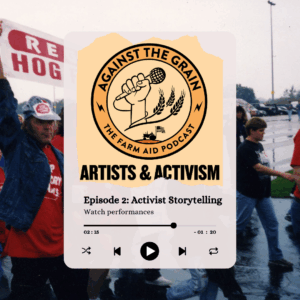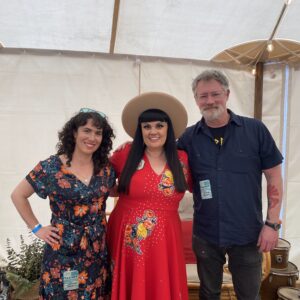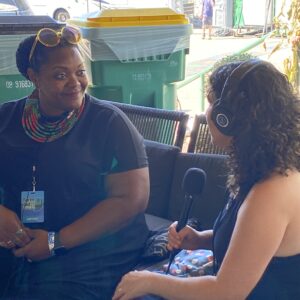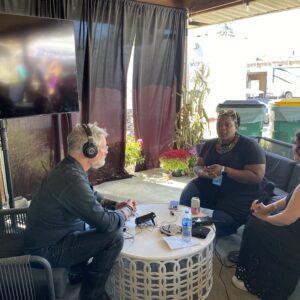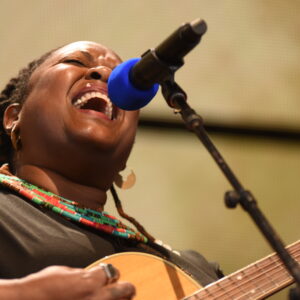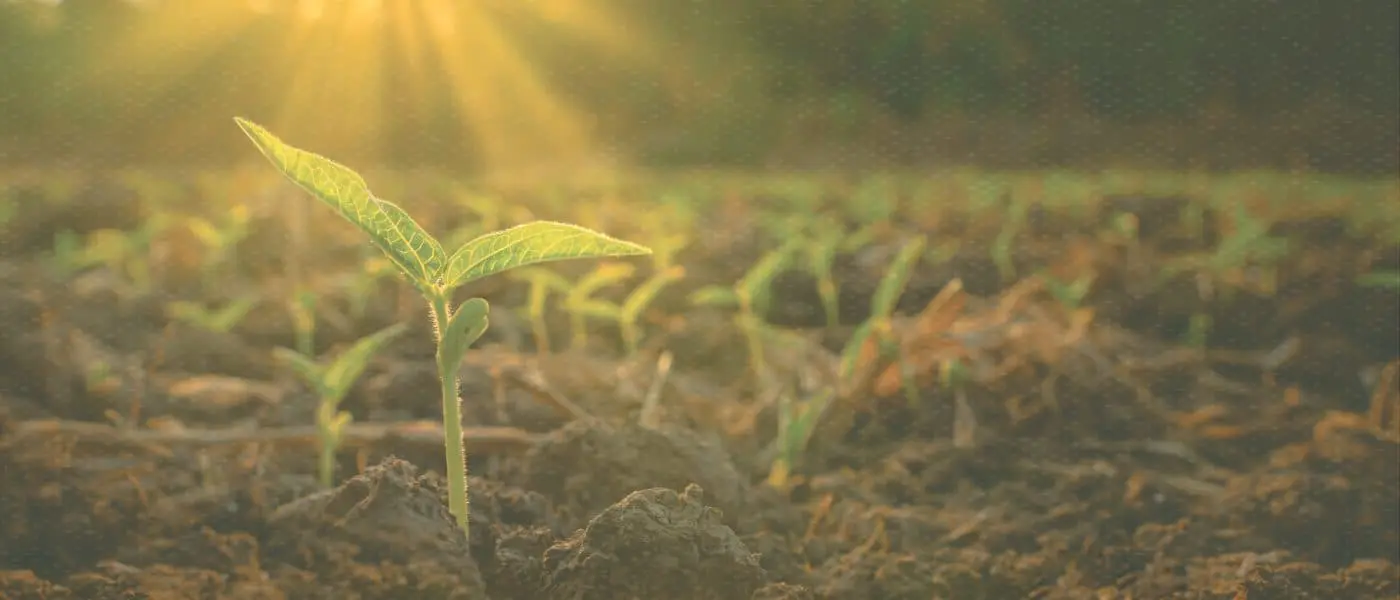In this second episode of Against the Grain’s series on Artists and Activism, we carry on from last episode’s focus on the folk singing tradition to explore the ways artists use their storytelling skills and platforms to engage with important social and political issues. We’ll hear from Steve Duncombe, co-founder of the Center for Artistic Activism, who helps us understand how artists use storytelling to tap into emotion – a visceral response that moves listeners to act. And then we talk to a power trio of women artists for whom storytelling is central to their art and politics: Farm Aid board artist Margo Price, Kyshona and Tami Neilson.
Listen to the episode below. And, make sure to subscribe in your podcast app of choice!
Companion Video Playlist
Watch artists featured in this episode in this video playlist!
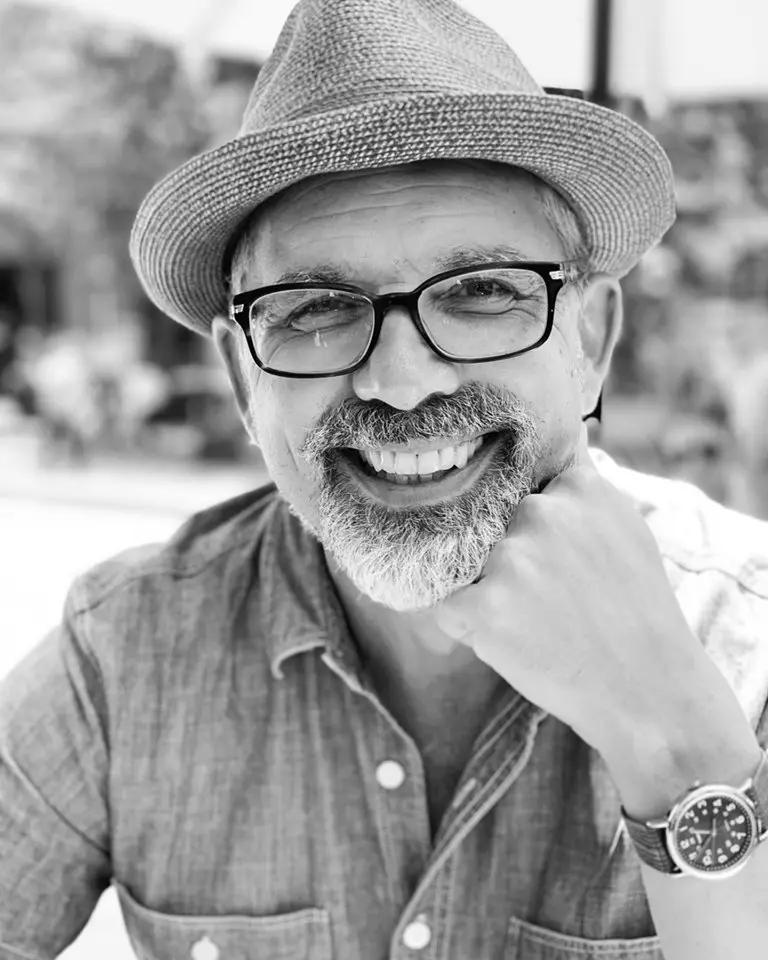
Stephen Duncombe has more than three decades of experience as an educator and activist. With a PhD in Sociology, he has taught in the City and State Universities of New York. Currently he is a Professor of Media and Culture at New York University. Duncombe received: Chancellor’s Award for Teaching at SUNY; Dean’s Award for Excellence in Teaching at NYU; The University Distinguished Teaching Award at NYU.
An activist his entire adult life, he co-founded a multi-issue community activist group in the mid 1990s, the Lower East Side Collective. During this period the group won an award for “Creative Activism” from the Abbie Hoffman foundation. He was also a lead organizer in the international direct action group Reclaim the Streets.
Stephen Duncombe is the author and editor of eight books, including Dream: Re-Imagining Progressive Politics in an Age of Fantasy and the Cultural Resistance Reader. He writes on culture and politics for a wide range of scholarly and popular publications. Duncombe created an open-access, open-source, web-based edition of Thomas More’s Utopia. His scholarly and activist work has been supported by, among others: the Open Society and Fulbright foundations; the National Endowment for the Humanities; and
National Endowment for the Arts.
In 2024 Duncombe published Æffect, a book on assessing the impact of artistic activism. Steve Duncombe co-founded the Center for Artistic Activism with Steve Lambert in 2009.

Margo Price performs at Farm Aid 2024. Photo © Brian Bruner / Bruner Photo
Nearly a decade ago, Margo Price turned Nashville on its head with her breakthrough, beloved debut solo album, Midwest Farmer’s Daughter. Released in the throes of bro-country and before pop stars were crossing over into the genre left and right, it showcased an artist completely unafraid to double down not only on herself, but what she’d always loved: classic country songs written from the intellect and the gut, hell-bent on truth-telling and both timeless and urgent all at once. Respected by her peers, praised by critics and beloved by her fans, Price created a lane where independent-minded, insurgent country music can exist and thrive alongside the mainstream, and became an ardent fighter for her beliefs in a genre where the norm is to shut up and sing. A trailblazer and a champion for the craft, Price redefined what it meant to be a modern country artist.
Since releasing Midwest Farmer’s Daughter, Price has barely slowed down. She’s made four records, played Saturday Night Live, been nominated for a Grammy, toured the world alongside artists like Chris Stapleton and Willie Nelson, released a lauded memoir (Maybe We’ll Make It, due on paperback September 2nd), became an in-demand producer and was appointed as the first female board member of Nelson’s Farm Aid. And she’s been fearless when it came to genre, venturing into psychedelic rock on her most recent, Jonathan Wilson-produced record, Strays. It would have been easiest to just stay that course, and keep running. But Price doesn’t follow success or comfort. She follows the art.
Price had also established herself as one of the most passionate, vocal artists in country music and beyond when it came to standing up for political and personal causes, from the presidential election, to abortion to gun control: happily hard headed when it came to the fight for equality and justice, especially for the working class and underserved in our society. Price has always brilliantly woven her activism into her songs, but her role as a spokesperson had started to overtake, on occasion, her role as a songwriter. She wanted to focus on using her written word to deliver the most potent punch of all.
And now she’s back with an exquisite, truly timeless album that reconnects with her roots and pays tribute to the art of the country song, inspired in part by the legends whom she now calls colleagues and friends. Hard Headed Woman is both a look forward and a look back: a way to march forward while staying true to yourself when the path of less resistance is right there in front of us, and short cuts are around every corner. And a way to look back when we need to trim what is no longer working, and to stay connected with where we’re from. It is a promise and a manifesto, a love song to both a city and a genre, and a defiant cry for individuality.
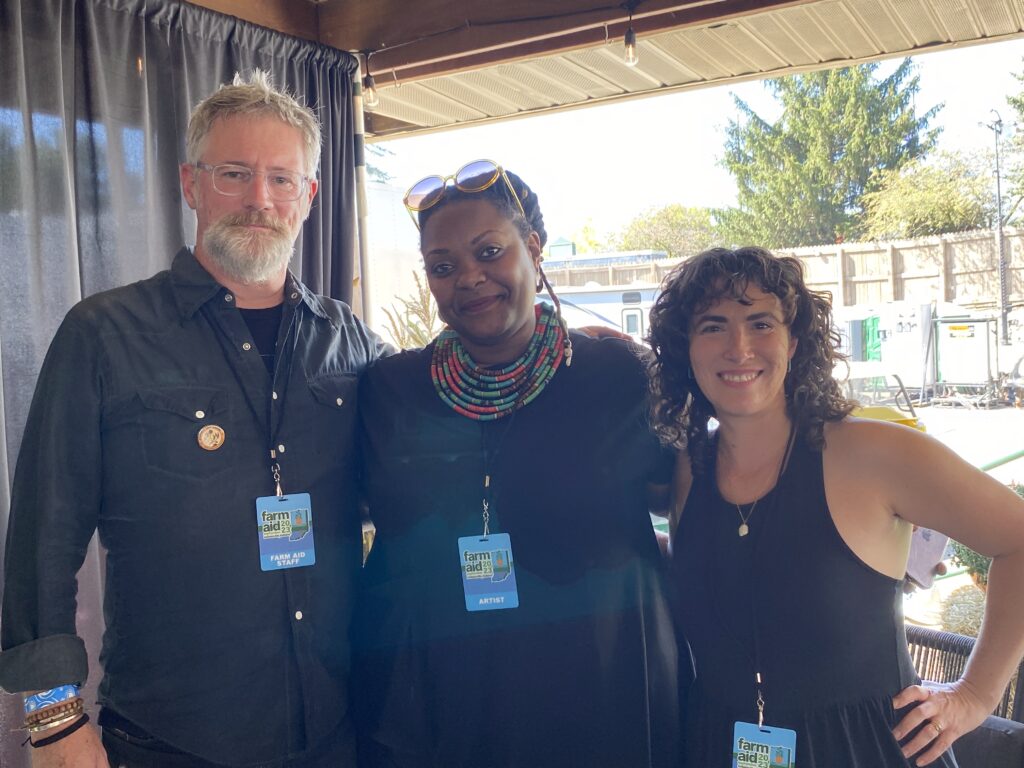
Kyshona lends her voice and music to those who feel silenced, forgotten or alone. She began her career as a music therapist, writing her first songs with patients — students and inmates under her care. She became compelled to write independently and find her own voice, an endeavor which led her to the Nashville creative community and songwriting culture. Since then, she balances her music career with her passion to heal in community through her organization Your Song.
Kyshona’s new project LEGACY focuses on family. Through stories, photos, film, ancestry and genealogy research, and travels in the power of place, Kyshona shares her story while inviting listeners and concert goers to join her in exploration of self, healing and growth. The album LEGACY released in April 2024, and Kyshona has been on an extensive US tour offering various types of experiences including concerts, speaking events, workshops, and virtual meetings.
Over the last few years, in addition to three new original singles and multiple music videos, she released a collection of recordings and videos in collaboration with Centennial Park Conservancy – recorded at Nashville’s Parthenon, in front of a monumental sized gold statue of Athena. A song she wrote with ZG Smith called “Nighttime Animal” was named to American Songwriter’s Top 25 Songs of 2022 and enjoyed spins on AAA radio. She wrote an article for No Depression magazine, and was invited to speak at several events including giving a keynote address for 2023 Fulbright Scholars. She is featured in a 2023 PBS television show called “Ear to the Common Ground,” gathering fans around a dining table to discuss voting rights in America, and she will be featured in an upcoming video series featuring Americana artists performing in the prestigious Schermerhorn Symphony Center Theater in Nashville.
Her song Listen was an anthem for many in 2020. Of her album of the same name, one fan reviewer wrote: “Amidst these hard, divisive times this set of songs is a salve for the grief many of us are feeling about resulting loss of family, friends, and community.” Within the grooves of its 10 tracks, Kyshona blends roots, rock, R&B, and folk with lyrical prowess to uplift the marginalized and bring awareness to the masses. It’s for every silent scream, every heavy load, fearful thought, and a simmering sense of anger that the repressed, the lost, and the forgotten try to hide from the world.
Audiences will find a common thread of empowerment, overcoming adversity, and finding hope in her work. The show doesn’t end when the last song is sung. After her powerful performances, concertgoers often ask, “What can I do?”
Her response? “Listen.”
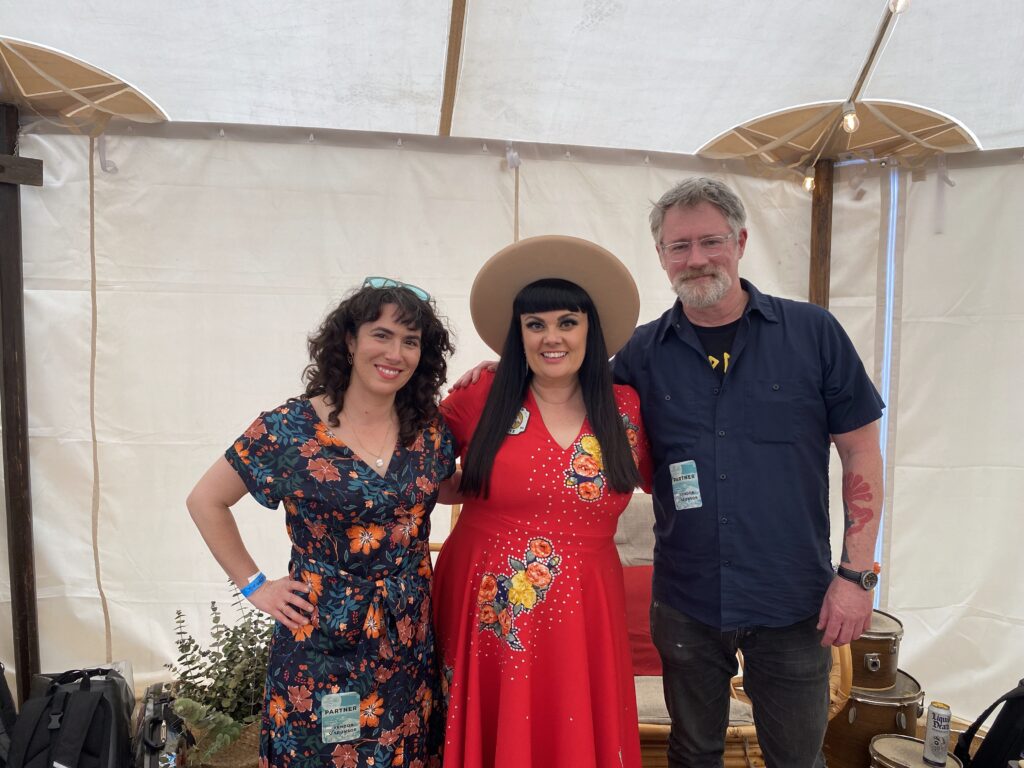
From being cradled as a baby in the arms of Roy Orbison, to performing a duet with Willie Nelson, one would think that Tami Neilson lived a country music fantasy life.
However, between these monumental occurrences, The Neilson Family Band, including Tami, Tami’s parents and two brothers, were busking in the streets of small-town Ontario to put food on the table. They performed gospel concerts to prisoners and roared down the Trans-Canada Highway in an exploding RV to open for Johnny Cash, which Tami managed to do at 18 years old in her pajamas.
Tami left to start her own family on the other side of the world in New Zealand, where she now resides. Her busking chops served her well as she took to the streets of Auckland looking for her big break. From open mic nights and clubs to headlining theatres and major festivals across New Zealand, Tami has now won almost every music award possible.
“Neon Cowgirl represents a lifelong dream of chasing Nashville and country music,” Tami says. “This album came rumbling to life on six wheels over the highways of North America. I wanted our children, born and raised in NZ, to get a taste of their Neilson family heritage – a five month pilgrimage from coast to coast and back again in a 36 foot RV. It was also my once-in-a-lifetime chance to really give it my all with my career, which I’d built slowly and steadily in small 2-3 week increments over a decade, running back and forth from the other side of the world. Then, only two months before our trip, I landed in the hospital for a month, battling for my life in ICU with sepsis. Our trip changed from one of me going full throttle to make a good dent in my career to one of recovery and slow healing. It became a time of embracing life fully and savoring the precious time with my family in a way one does only after a near-death experience. We zig-zagged across the country, from the ghostly halls of Graceland to the technicolor desert of Salvation Mountain, across neon graveyards in Las Vegas to driving alongside herds of buffalo in Montana.”
“I collected the seeds for these songs in each place along the way. When they blossomed, there were crossbreeds of Presley and Patsy, Orbison and kd lang- the blues of Memphis, the twang of Texas, the cinematic torch of Judy Garland on a Hollywood soundstage. But, mostly, it became a love letter to my Neon Cowgirl. Or, more accurately, a lovelorn letter. Because she’ll just keep on breaking a foolish heart if you let her.”
Episode 2: Activist Storytelling
KURN: Welcome back to Against the Grain, The Farm Aid Podcast. I’m Jessica Ilyse Kurn.
FOLEY: And I’m Michael Stewart Foley. In this series, Artists and Activism, we’re exploring how so many artists in one way or another follow the example of Farm Aid founder Willie Nelson, showing up on the issues that are important to them.
KURN: In this episode, we focus on artists who’ve had to navigate public pushback after speaking out. To start, we’re picking up where we left off on the last episode when we talked about how the public’s reaction to an artist’s activism can be very context specific and how it’s often gendered or racialized. All of the artists we spoke to for this episode can attest to that, Margo Price, Kyshona and Tami Neilson.
FOLEY: But before we get to the artists themselves, we wanted to bring in an expert to dig a little deeper into art as activism and activism as art.
DUNCOMBE: My name is Stephen Duncombe, and I’m a professor at New York University. I’m also the co-founder of the Center for Artistic Activism.
FOLEY: Steve is also the author of a bunch of great books, including one on punk zines and relevant to this conversation, The Art of Activism book that he wrote with Steve Lambert, his co-founder at the Center for Artistic Activism. Yes, 2 Steves. Duncombe came from a background in community organizing, and Lambert is an artist with a background in political art.
DUNCOMBE: I was, uh, organizing marches and protests that I didn’t really even want to go to because they were so boring. And Steve on the other coast, I was working in New York, he was in San Francisco. was having this really super exciting uh art shows, um, which eight people showed up to, and then nothing happened. And so we kind of figured, hey, wait a second, you know, this art stuff is super exciting, um, but it doesn’t lead any place. This activism stuff’s really boring, but when it does work, it actually leads someplace and brings about change. Let’s try to learn from one another. And the first thing we learned is there’s a lot of other people combining arts and activism and there has been for thousands of years.
KURN: Steve spoke to us from his New York City office. The sound of ambulances could be heard whirring behind him, but even with a constant commotion, he was calm and focused, and one of my favorite things he explained to us was about expanding our notions of art and activism.
DUNCOMBE: I would start by saying that all good activism has always been artistic activism. Anytime you have good activism, it’s working with sign and symbol and story and spectacle, right? Um, it’s tapping into popular culture, popular songs, popular stories, popular myths. And that’s what good activism does because it wants to connect with people. And so I’d say all good activism is artistic activism. If you ask people how they became activists, and I’ve done this around the world with thousands of people.
I asked them, How did you become an activist? And invariably they tell stories. And those stories are really varied depending on where they are and what their personal history is, but they do have some similarities. They’re often about an experience that happened in their life. Um, it can be an experience that happened to them, it can be an experience that happened to someone they loved. It can be an experience that even saw, it can be a story that was told to them by their parents, um, and it could be a story of injustice done or standing up and demanding justice. Um, but what they all have in common is they’re really emotional stories.
Um, people are moved by emotion.
FOLEY: Well, that certainly dovetails with what we’ve heard from artists when we spoke to them for this series, how they came to tell the stories that move us in service of a cause. When we come back, we’ll hear from Kyshona.
FOLEY AD: If we all stand with family farmers, we can make a real difference in our food system. Your donation to Farm Aid strengthens family farmers so that they can thrive, and it keeps them on the land where they belong. Please make a gift today by heading to FarmAid.org/podcast.
KYSHONA: So I’m KYSHONA. I’m right here backstage in the little hangout area at Farm Aid. Um, we just finished our set. I had the opportunity of sitting in with the Black Opry today.
KURN: That was at Farm Aid 2023 in Noblesville, Indiana. It was a super hot day filled with glorious music. We met up with Kyshona on a covered deck behind the stage where artists were hanging out pre and post set. You may remember an episode from last season when we talked about Black land loss or land theft, and Kyshona told us about her family’s land in South Carolina, which once amounted to 175 acres and sadly now is down to only two.
FOLEY: Yes, you can find a link to that episode on Farmaid.org/podcast, where we have all of our episodes. But we also talked to Kyshona at length about the work she does as a storyteller.
KYSHONA: So I have a mission. My mission statement is to be a voice in a vessel for those who feel lost, forgotten, silenced to who are hurting. So through that I created an organization called Your Song. It’s therapeutic songwriting. I’m a licensed music therapist as well so um that’s what I did before I was a full time singer songwriter. I was a music therapist working in the mental health world.
I was working with at risk youth um in Georgia and I got burnt out because back then, way back in the day, we weren’t talking about self-care at all so I was just working with, you know, in the forensics units and the high risk areas, so I tapped out and moved to Nashville and thought my patients taught me how to write. Let me, let me like craft that let me lean into that a little bit more. I found that even after tapping out I’ve come back to being a music therapist again through the work that I do so with the storytelling that I’m I’m doing when I’m on stage performing, it’s all about these conversations I’m having with people about their legacies, about their struggles.
FOLEY: Kyshona does such amazing work. We hope you’ll go check out Your Song’s website to learn more about the work she does. Your Song is a collaborative songwriting program that connects performing arts centers, musicians and artists with vulnerable communities to promote healing and community connectedness.
KURN: If that’s not mobilizing your artistic talents for a good cause, then I don’t know what is.
KYSHONA: I work with a lot of women who are in recovery, women and men who are in recovery, people that have pulled off the streets from sex trafficking, working with those that have been released from incarceration, um, and the mission is honestly just how can I show people that their story there’s nothing to be ashamed of. There is something healing and you sharing your story standing in your power, telling people your story because you’re gonna help someone else in their healing process, right? So helping them write an anthem, a song that they can sing to themselves, a mantra that they can share. I have so many anecdotes in my mind of how one song has spread even after a client was released from prison, but the women in the jail are still singing their song, you know, and that’s how far a song that’s what a song can do a song can be a form of history and so this is the work that I do. I’m I’m, I feel like I’m a collector. I’m a disruptor, but I’m also a unifier and a healer with the work that I do through your song as well as the artist side of myself, Kyshona.
FOLEY: That was Kyshona playing her song Whispers in the Walls at Farm Aid 2023 in Indiana. I don’t know about you, but I first heard about Kyshona when she was opening for Margo Price on tour, the same way I first heard about Tre Burt, who we featured in our last episode. Margo’s really good at supporting like-minded, badass artists.
KURN: She was so impressed with Kyshona that she asked her to play Farm Aid, and it’s not surprising that these two women connected, given Margo’s own style of songwriting and political engagement.
PRICE: I think of myself as an artist and I think also as a cultural worker, you know, I think the songwriting is, is so much a part of my soul that’s, you know, sometimes it’s it’s a lot of emotions and, and so therefore, It becomes political because really everything is political and whether we want it to be here or not.
KURN: Margo told us that when she and her husband Jeremy Ivey started out in Nashville, they wanted to write only social and political songs for their band Secret Handshake.
PRICE: We would go play them at open mics, writers nights, at just bars and, you know, places where other people were just trying to get like. I don’t know, pop country hits and stuff and then here we’d come in with a song called Bloodshed that was about the Iraq war and, and, uh, those things, we cleared out rooms and at times, and I didn’t really let it bother me. I just, I, I kind of looked at it more like a social experiment sometimes.
FOLEY: By the time Margo released her breakthrough album, Midwest Farmer’s Daughter in 2016, her songwriting focus had turned towards storytelling. Based like Steve Duncombe mentioned, on her own and her family’s experience. She credits Farm Aid and our president Willie Nelson as models.
PRICE: Farm Aid was kind of ever present. I remember hearing, seeing about it, and you know, as was Willie Nelson, he was just kind of this otherworldly figure to me, but somebody who is so uniquely been able to bring together so many different walks of life, so many different kinds of people with his music, and with a movement like Farm Ai. That was always, it was something that was really hopeful. To be hearing about, you know, I think we need so many more people to be invested in working in this problem right now because, you know, it’s, it’s still going on and, and I wish that um that my family could have had some kind of, you know, assistance or or help from that, but it was just the problem was just so, so large, so insidious and it carries on today. So it’s, I think that the work is more important now than than ever.
KURN: That’s the key right there. That’s Margo’s activism. Her commitment to what she calls the work comes not only from an understanding of what Farm Aid has been doing for 40 years, but from the deep well of her family’s own experience. If you have listened to Midwest Farmer’s Daughter, you’ve heard the song Hands of Time, which tells the story of Margo’s family losing their family farm in the 1980’s farm crisis.
PRICE: So it was my grandparents’ farm, but they had five children and they all, you know, worked and and that was their profession too, you know, my father, they kind of just went into it. So it was early 80’s and it’s taken a lot of digging and a lot of questioning to try to get to the bottom of, of what happened and And why everything kind of fell apart, but it was basically just a perfect storm of bad year, a drought, then coupled with, you know, these grain bins that they had put in and just getting into a lot of debt and then also just small town politics, where there was a banker in town that a lot, a lot of corruption went down and this guy ended up going to jail like actually just I don’t know, maybe five years ago or something. It’s been a source of like, you know, shame and embarrassment, I think for my family and, and so being able to kind of be a part of a farm aid, it felt healing for me.
FOLEY: In the same way that Kyshona described the work she does with her your So project, Margo channeled her family’s story into song.
PRICE: When I wrote Hands of Time, it was really just a, um, it was more an exercise in like healing or something. I mean, I know that sounds very like. Very woo woo, but, um, you know, that was just the songwriting doing the work on helping me grow as a person and helping me close a lot of doors and and things that were, I don’t know, plaguing me, you know, ghosts that were haunting me, stuff like that.
FOLEY: Margo’s Hands of Time ranks right up there with John Mellencamp’s Rain on the Scarecrow and with Heartland, the farm crisis song written by Willie Nelson and Bob Dylan as kind of iconic Farm Aid songs. Check out these songs and more on this episode’s playlist. Head to Farmaid.org/podcast to listen.
KURN: Hands of Time was an early example of Margo’s songwriting as a vehicle for not only her own healing, but for raising awareness and inspiring change. On her next album, All American Made, Margo continued her activist storytelling with songs like Pay Gap.
PRICE: I mean, as far as you know, women’s rights are concerned right now, there are none. There is, we are in an absolute backwards place. It’s always kind of the same story if if there’s a woman who says something, it’s like men, men are kind of more allowed. To have political opinions and to have, I, I think, you know, it’s like you look back at Willie Nelson and and just the way that he’s always kind of used his platform to spread good and I think people that really know him, they know that he’s very open minded. But for some reason when a woman has an opinion about literally anything, now if people don’t like it, they’re just going to Immediately write her off, they’re going to say, you’re ugly, you’re this, you’re that, and it’s kind of been that way for a long time.
I do see things changing, at least there’s awareness to the problem, and I think there’s a lot of doors being broken down, but the patriarchy is still alive and breathing and you know, we won’t see the close of the pay gap until maybe my grandkids. I don’t know, it won’t be in my lifetime, that’s for damn sure. But all we can do is, uh, continue to move the needle inch by inch. I feel proud to say I’m a feminist and there’s no looking back.
KURN: Given the gender pay gap in essentially every profession and the persistent discrimination against women in the music industry like that not so secret rule against playing two female artists in a row on country radio. It is no surprise that industry bias and some unsavory accounts make their way into the songs female artists write.
FOLEY: Another artist we had the pleasure of speaking to at Luck Reunion last year was Tami Neilson.
NEILSON: My name’s Tami Neilson, and we’re coming to you live from Luck Reunion in Texas. I tend to, um, I mean, I write from life experiences as most songwriters do, and being a woman in the music industry, particularly in the country music industry. Um, is something that really informs my work. Family informs my work, um, but my lived experience, and so I tend to sing a lot about, you know, challenging inequalities in the music industry and, uh, especially for women. When you look at, you know, country music radio across North America in 2023, was less than 10% of radio play was made up of female artists and Even worse than that, 0.03% was made up of women of color, you know, so it can be really disheartening, and I think that the way to kind of cope with that and, and bring awareness because a lot of people don’t realize that imbalance and so singing about that and challenging it and writing songs to encourage and embolden and empower other women. Um, it is really important to me and it’s a thread throughout my music, yeah.
FOLEY: In fact, Tami’s put together an entire live show called The F Word: Songs of Feminism and Country Music, that tells the story of pioneering women and their struggles in the country music establishment. From Maybell Carter, Loretta Lynn and Dolly Parton to the Chicks and Mickey Guyton. The show includes an avalanche of data assembled by musicologist Jada Watson on gender inequality in country music.
KURN: And in the time since we sat down with Tami, she got together with Ashley McBryde, Shelly Fairchild, and Grace Bowers, another guest on this series, to put out Borrow My Boots, a blistering song on Tami’s new album, Neon Cowgirl, all about women standing shoulder to shoulder as they kick down the barriers to equality.
NEILSON: And so I think that wrapping up something really important like Farm Aid. In joy and music is why it’s such an impactful organization, because I think whenever you have activism. Uh, you can deliver it in a way that people are open instead of closing off, you know, you’re, you’re, you’re delivering it with open arms and acceptance and therefore they’ll receive it that way. And um, I think that’s something that Willie has really taught me, you know, because I think a lot of when you’re starting out and you’re a young artist, it can be very confronting and abrasive. I want to stand up for what’s right, you know, and that’s important. It’s important to have that fire, but it’s also important to have the wisdom and the acceptance because you’re, you’re going to have a lot more people listen to you, and embrace your message if it’s delivered in a way that is inclusive and accepting and joyful, and I think that’s Willie, you know, that he embodies that.
FOLEY: Join us in Minneapolis in September to hear more artist activists. Go check out our website for more information on tickets and other details. That’s www.farmaid.org/podcast.
KURN: In the next episode, we talk to artists with personal stories from the farm who use their voices to advocate for much needed change in our farm and food system, kind of like Farm Aid’s been doing for the past 40 years.
MAHAL: I’ve always been a supporter of of the family farm and the small farmer. Can’t talk about the land of the free and then corporate agriculture is like running people out of business. It’s like, why can’t you make room for them? Why does it always have to be that kind of thing is that?
FOLEY: That was just a small bite from Taj Mahal’s awesome interview from the next episode. Be sure to subscribe to Against the Grain so you don’t miss a beat.
KURN: Is there something you want us to cover in the future? Send us an email or drop a comment. You can email us at podcast@farmaid.org and find us on social media, which is @Farmaid on Instagram, Facebook, threads, and now on BlueSky.
FOLEY: And don’t forget YouTube, where you can watch almost 40 years of performances and other content. Let your friends know about Against the Grain. We’re beyond grateful when you listen, share, like and subscribe to this podcast.
KURN: Against the Grain was written and produced by us with sound editing by Endhouse Media and direction from Dawn Sarokin. And thanks to Micah Nelson for our awesome theme music.
FOLEY: Thanks so much to all the artists who took the time to speak with us. Head over to our website to watch videos, check out those playlists, and learn more. www.farmaid.org/podcast. And thanks to all the farmers out there. We’ll chat with you next time.
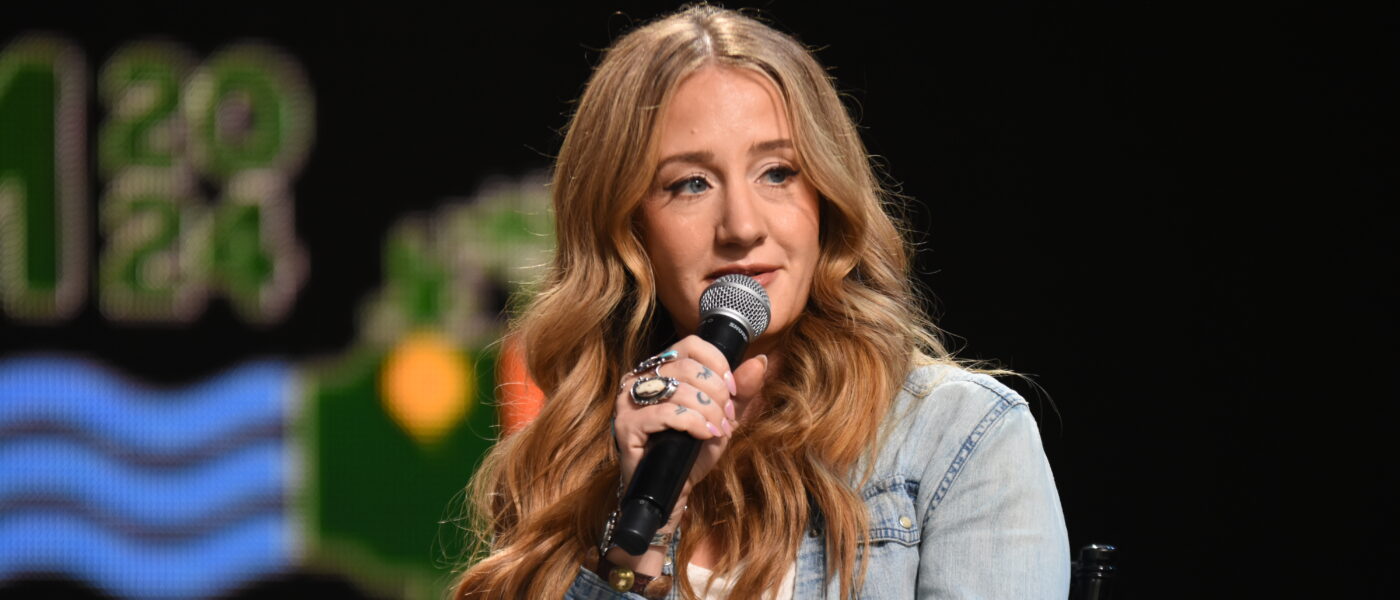
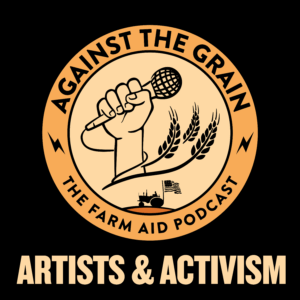 Listen to the Artists and Activism series of Against the Grain: The Farm Aid Podcast to hear from more than two dozen artists who use their art and voices as vehicles for political engagement and expression on issues that matter to them.
Listen to the Artists and Activism series of Against the Grain: The Farm Aid Podcast to hear from more than two dozen artists who use their art and voices as vehicles for political engagement and expression on issues that matter to them.
